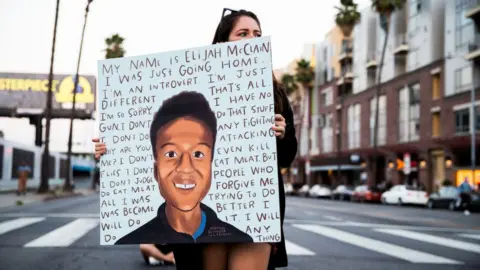Elijah McClain pleaded 'I can't breathe' before he died, trial hears
 CBS / Mari Newman
CBS / Mari NewmanTwo Colorado officers ignored a man's pleas of "I can't breathe" before a medic injected him with ketamine and he died, a court has heard.
Prosecutors accused Randy Roedema and Jason Rosenblatt of using excessive force during an unjustified stop of Elijah McClain on 24 August 2019.
But attorneys for the two officers blamed the paramedics who injected Mr McClain, 23, with the potent sedative.
The black man's death faced renewed scrutiny after George Floyd's murder.
Mr McClain, a massage therapist, was walking home from a corner shop when three white police officers confronted him after an emergency caller reported a "sketchy" person in the Denver suburb of Aurora.
It was a summer night and Mr McClain was wearing a balaclava, which his family has said protected him from chronic chills due to his anaemia. He was unarmed.
Listening to music on his headphones, he had initially ignored officers' calls for him to stop walking.
Body camera footage of the incident shows him pleading with officers that he did nothing wrong before they wrestle him to the ground and place him in a chokehold.
Seven times, Mr McClain is heard telling the officers: "I can't breathe" - the same refrain uttered by Mr Floyd as he was murdered by a police officer in Minneapolis, Minnesota, in 2020.
"Listen to Elijah's words," state prosecutor Jonathan Bunge said during opening statements on Wednesday as he replayed the footage in court.
"When Elijah is on the ground handcuffed, he's saying over and over and over again, 'I can't breathe. Please help me.'"
After officers called for assistance, a medic injected Mr McClain with ketamine to sedate him.
Mr McClain went limp, stopped breathing and never regained consciousness. He was declared brain-dead three days later.
A revised coroner's report, issued in 2021, concluded that Mr McClain's cause of death was due to complications from the drug he was administered, with the pathologist writing he "would most likely be alive but for the administration of ketamine".
Indictment documents allege the medic estimated Mr McClain's weight at 14st 4lbs (91kg) when he was in fact closer to 10st.
Defence attorneys at Adams County District Court on Wednesday argued it was the sedative that had killed Mr McClain.
"After being injected with ketamine, that's when Mr McClain's pulse stopped," Mr Roedema's attorney, Reid Elkus, said in his opening remarks.
"Mr McClain died because paramedic [Jeremy] Cooper injected him with 1.7, 1.8 times the ketamine for someone his weight and size."
Mr Elkus added that the police had made the stop in a "high-crime area" and issued several verbal commands before escalating the situation.
"Just because a tragedy occurred doesn't mean criminality occurred," he told the court.
 Getty Images
Getty ImagesThe case is expected to turn largely on footage of the fatal encounter.
Mr McClain is heard saying: "I'm an introvert. Please respect the boundaries that I am speaking."
But Mr Rosenblatt's lawyer, Harvey Steinberg, argued on Wednesday that Mr McClain had shown "continued resistance" and appeared to have "gone for" one officer's gun.
"Please be fair and don't allow emotion or sympathy to come into it," Mr Steinberg said.
"And don't let politics enter into this at all."
Mr Roedema, who was fired in 2020, and Mr Rosenblatt, who remains suspended, have pleaded not guilty to charges of reckless manslaughter, criminally negligent homicide and assault causing serious bodily injury.
A mostly white jury of seven men and seven women, including two alternates, were seated on Wednesday morning in a trial that is expected to last about a month.
It is the first of three trials in relation to Mr McClain's death.
A grand jury in 2021 also returned charges against a third officer, Nathan Woodyard, medic Jeremy Cooper and a second medic, Peter Cichuniec.
All three have also pleaded not guilty. They will be tried in two separate cases later this year.
Also in 2021, the city of Aurora settled a civil rights lawsuit by the McClain family for $15m (£12m).
A state investigation that year accused the city's police and fire departments of a pattern of racial bias and excessive use of force.
Correction 1 November 2023: A reference to Elijah McClain being autistic has been removed, after a representative for the McClain family told the BBC he did not have autism.
